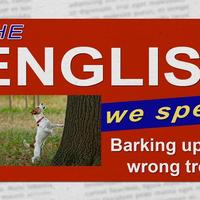Barking up the wrong tree: The English We Speak - YouTube
Auf der falschen Fährte: Das Englisch, das wir sprechen - YouTube
Γαβγίζει σε λάθος δέντρο: YouTube
Ladrando al árbol equivocado: El inglés que hablamos - YouTube
L'écorce sur le mauvais arbre : L'anglais que nous parlons - YouTube
Abbaiare all'albero sbagliato: L'inglese che parliamo - YouTube
間違った木に吠える:私たちが話す英語 - YouTube
Szczekanie na niewłaściwe drzewo: The English We Speak - YouTube
A ladrar para a árvore errada: O inglês que falamos - YouTube
Лаять не на то дерево: Английский язык, на котором мы говорим - YouTube
Yanlış ağaca havlıyoruz: Konuştuğumuz İngilizce - YouTube
Гавкаємо не на те дерево: Англійська, якою ми говоримо - YouTube
误入歧途我们说的英语 - YouTube
吠叫錯誤的樹:我們說的英語 - YouTube
Feifei: Hello and welcome to The English We Speak.
I'm Feifei...
Rob: And I'm Rob. Hello.
Errr, Feifei, you're looking a bit angry.
Errr, Feifei, estás com um ar um pouco zangado.
Feifei: Me, angry! I am angry.
Feifei: Eu, zangada! Eu estou zangada.
Rob: Oh no, what's the problem?
Feifei: I think you know Rob.
Somebody told the boss
that I spilt coffee over his computer
que entornei café no computador dele
yesterday - and now he's angry with me.
Rob: Oh no. What kind of mean and horrible person
Rob: Oh não. Que tipo de pessoa má e horrível
would try and get you into trouble?
あなたをトラブルに巻き込もうとするのでは?
Feifei: You and the boss were the only people
Фейфей: Ви з босом були єдиними людьми.
left in the office last night. Hmmm?
залишив в офісі вчора ввечері. Хммм?
Rob: Whoa - hold on Feifei. If you are implying
Rob: Uau - espera aí, Feifei. Se estás a insinuar
it was me who told the boss, then you are
barking up the wrong tree.
a ladrar para a árvore errada.
Feifei: Please don't make me any angrier
Feifei: Por favor, não me deixes mais zangada
by saying that I am like a dog!
私は犬のようだ!
Rob: No, no Feifei. Just calm down.
Rob: Não, não, Feifei. Acalma-te.
I should be angry because you are making the wrong
私は怒らなければならない。
Eu devia estar zangado porque está a fazer as coisas erradas
assumption about who told the boss, OK?
That's what I mean by barking up the wrong tree -
É isso que quero dizer com "ladrar para a árvore errada".
you want to blame someone but you got the wrong
quer culpar alguém, mas está enganado
ви хочете звинуватити когось, але помилилися
person. I didn't even know you had done it.
людина. Я навіть не знав, що ти це зробила.
Feifei: OK, I'm sorry. So the phrase 'barking up the wrong
Фейфей: Гаразд, вибачте. Отже, фраза "гавкати не на того
tree' means making the wrong assumption
дерево" означає зробити неправильне припущення
when trying to achieve something.
Shall we hear some examples while I make you
a coffee to say sorry...?
お詫びのコーヒー?
Examples: If you think I have enough spare cash
Exemplos: Se achas que tenho dinheiro suficiente
Приклади: Якщо ви вважаєте, що у мене достатньо вільних коштів
to pay for your holiday, then you're
щоб оплатити свою відпустку, то ви
barking up the wrong tree.
гавкають не на те дерево.
You're barking up the wrong tree if you think
I was the one who said you were leaving.
Fui eu que disse que se ia embora.
Це я сказала, що ти їдеш.
It wasn't me!
Não fui eu!
Це був не я!
You're barking up the wrong tree if you think
と思っているのなら、それは大きな間違いだ。
I'm going to lend you my car. I've seen how you drive!
僕の車を貸すよ。あなたの運転を見たから
Я дам тобі свою машину. Я бачив, як ти водиш!
Feifei: You're listening to The English We Speak.
Фейфей: Ви слухаєте The English We Speak.
We're talking about the phrase
'barking up the wrong tree'.
"a ladrar para a árvore errada".
It means to make a wrong assumption
about someone or something.
Rob: The phrase can also mean doing something
in a way that will not work - you're basically
wasting your time. Like a detective trying to solve
даремно витрачаючи свій час. Як детектив, який намагається розкрити
a crime by obviously arresting the
um crime ao prender obviamente o
злочин, очевидно, заарештувавши
wrong man - he's barking up the wrong tree.
не та людина - він гавкає не на те дерево.
Feifei: Ok Rob understood - and here's your coffee
Фейфей: Гаразд, Роб зрозумів - ось ваша кава.
to say sorry for barking up the wrong tree.
вибачитися за те, що гавкав не на те дерево.
Rob: Thanks - make sure you don't spill it this time.
Rob: Obrigado - certifica-te de que não entornas desta vez.
Роб: Дякую, але цього разу не розливайте.
The boss would be really angry!
Бос буде дуже розлючений!
(ANGRY DOG GROWL!) ...what did I say?
(...o que é que eu disse?
(...що я казав?
Feifei: If I find out you did tell the boss,
Feifei: Se eu descobrir que contaste ao patrão,
Якщо я дізнаюся, що ти розповів босу,
I'll make sure to bark up the right tree,
Vou certificar-me de que estou a ladrar para a árvore certa,
Я подбаю про те, щоб обкорувати потрібне дерево,
OK?
Rob: Oh Feifei, I hope your bark is worse than your bite.
Rob: Oh Feifei, ich hoffe dein Bellen ist schlimmer als dein Biss.
Rob: Oh Feifei, espero que o teu ladrar seja pior do que o teu morder.
Роб: О, Фейфей, сподіваюся, твій гавкіт гірший за твій укус.
羅布:噢,菲菲,我希望你的叫聲比你的咬傷更糟糕。
Bye.
Feifei: Bye

